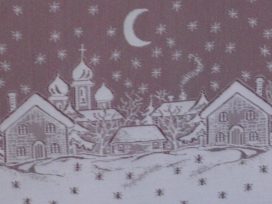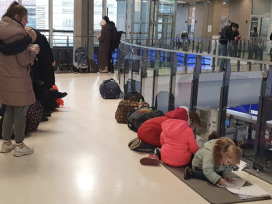
A leading Ukrainian-American writer on grace, justice, power and freedom.
Milan Kundera, in his brilliant novel The Unbearable Lightness of Being – which has been read to the last letter by roughly half of Slovenia this year since it is required for the essay part of the matura (the secondary school leaving exam) – views kitsch as the primary point upon which ideology consolidates people of all types; the mechanism of violence is activated only when kitsch fails. And what else is kitsch but a cliché, the universality of a contrived structure, in which our lives are trapped over and over, and which we also use to constantly regulate our lives?
The time in which we live presents to us as a basic ideological assumption that we in fact lack ideology: we have at our disposal an entire world from which we may freely choose our existential modus according to our own inclinations and will. But this is of course not entirely the case, since there are still more than enough clichés which assault us and take away our will in life when we find ourselves on the wrong side. And although I like living in a time without the Inquisition and penal colonies, I sometimes wonder whether they really are gone, or whether on a symbolic level they still operate in that most primary of threats to man as a social being, that we will be made fun of and unloved, and whether a punishment that literally casts out the individual from the social body when he or she in one way or another sins against its taboos is any less final.
Life is indeed always a cliché, and that which perseveres, and strives to persevere, is not us at all, but community. Community that is preserved over time through cliché. The purification we experience through art with its imagined worlds and imagined failed existences is the shudder that runs through us when faced with the possibility of being on the other side. Catharsis is the liability of our lack of involvement. And if art both extends our horizons and shoos us like frightened cats back between the rutted tracks of taboo, the space between the ruts, and along with it “real life”, is a reflection of folk and pop culture, which are built precisely on clichés which persist over time. Cliché teaches us how to be human in a given time and place and imposes limits on our engagement through a fundamental threat: being on the other side.
For this reason, I read with the same kind of kind of enjoyment Jan Smarcan’s collection of poetry, Her, in which the title itself is symptomatic, since the pain which marks the entire book is the pain of recognizing the failure of an attempt in which She would come into the body of cliché and make sense of life between the ruts of taboo. The doubled-over laughter that was triggered when it is revealed in the poem You are divine that the subject inspiring a romantic walk through the edge of a forest is actually a sheep masking the pain I dealt with myself in the novel Blood on the Hands, whose protagonist is a young woman who has been raped. Since even when you bear no share of the blame in transgressing the limits set by taboo, when you are actually a victim, this still does not absolve you in any way. The punishment is directed at the violation; individual guilt is not apportioned. For this reason (as I read not long ago in the Sunday newspaper Nedelo), during the time of the Spanish Inquisition, in cases of bestiality the animal victim was punished as well as the human perpetrator. Similarly, Slavenka Drakulic, in her novel As if I were not there, records that women who were raped in Serbian concentration camps found it easier to bear the act itself than to face the reaction of their own men back home.
A tribe fenced in by taboo is of course an unpleasant and difficult thing, especially for anyone whose will and aspirations place him on the other side, but we can only wonder whether there is anything else available to us. In the course of preparing to write my new novel Pontificate, now in progress, I studied the tradition of extreme subjectivism, especially its nihilistic and demonistic extreme, and I was overwhelmed by dread when I realized that man nevertheless cannot rely on some immanent inner goodness, build one’s world on subjectivism and at the same time maintain one’s humanity. Humanity is always purely participation in a community … and thus in cliché.
The extreme threat which is revealed at the core of nihilistic subjectivism is the recognition that there is no person on the other side of society; that which we understand as ourselves is a set of connectedness with others and with community, and in this context absolute self-sufficiency cannot mean anything but the absolute complete availability of the world, in which there is no longer any difference between Smarcan’s murderous psychopath and a romantic lover, there are only still choices which are completely interchangeable. We learn life as a cliché.
Humanity exists only in community. And however it limits us and frustrates our “free choice” is, paradoxically, the only guarantee of our humanity.
Published 21 June 2007
Original in Slovenian
First published by Dialogi 5-6/2007 (Slovenian version)
© Robert Titan Felix / Dialogi / Eurozine
PDF/PRINTSubscribe to know what’s worth thinking about.

A leading Ukrainian-American writer on grace, justice, power and freedom.

Remaining in a new country or returning home? The Knowledgeable Youth podcast delves into the complex decision-making refugees face when migrating, together with researcher Olena Yermakova.